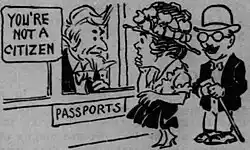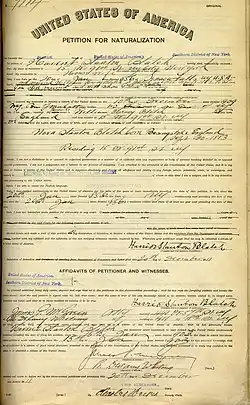
The US Expatriation Act of 1907 significantly shaped U.S. citizenship laws, particularly impacting women. This legislation stated that women’s citizenship was tied to the citizenship of their husbands, reflecting broader societal norms of the early 20th century. The act remained in effect until it was repealed with the Cable Act of 1922. Specifically:
- Any U.S.-born woman who married a foreign man automatically assumed her husband’s nationality and lost her U.S. citizenship, regardless of whether she moved abroad.
- Conversely, foreign-born women who married U.S. citizens gained U.S. citizenship upon marriage.
The law was based on the principle of coverture, which held that a woman’s legal identity was subsumed by her husband’s upon marriage.
The Cable Act of 1922 overturned the Expatriation Act, ensuring that women who married foreign citizens no longer lost their U.S. citizenship. However, women who had already lost their citizenship under the previous law were required to go through the standard naturalization process to regain it.
If you believed that a woman you are researching was affected by the Expatriation Act, here are some records you should keep in mind.
Research your ancestors on MyHeritage
Researching Female Ancestors Affected By the Expatriation ActResearching Female Ancestors Affected By the Expatriation Act
Birth, Marriage and Death RecordsBirth, Marriage and Death Records
If a woman lost her citizenship, you may notice some changes in various vital records. Since the Expatriation Act tied a woman’s citizenship to her husband’s nationality, the groom’s birthplace could be an important indicator of the bride’s possible change of citizenship. Additionally, the birth records for children born after the marriage might have the new nationality of the mother listed.
A woman could apply to regain her citizenship if the couple divorced or the husband died. If there is evidence of either of these events, take note of the date, and search for possible citizenship applications in the years afterward.
U.S. Census RecordsU.S. Census Records
Census records often indicate citizenship status. If a woman’s status changes over time, especially if she is listed as a citizen earlier and a non-citizen later, you may want to look for a marriage to a foreign national.
Naturalization Records and Passport ApplicationsNaturalization Records and Passport Applications

Women who lost U.S. citizenship might have filed for naturalization to regain it after divorce or widowhood. Additionally, they might be listed on their husband’s naturalization paperwork.
Another clue might be the presence of multiple passport applications for the same woman at different times. A woman would have her passport revoked upon marriage to a foreigner, and would then have to reapply for a new passport after regaining citizenship.
Voter Registration RecordsVoter Registration Records
Although women were guaranteed the right to vote nationally in 1920, some localities allowed women to vote in state or town elections before that time. When women lost their citizenship, they usually also lost the right to vote. Similar to passports (above) you may see instances in which a woman has multiple voter registration documents due to a lapse in citizenship.
Passenger Lists and Travel RecordsPassenger Lists and Travel Records
Most passenger lists from overseas ships arriving in the US contained information on the citizenship status of those traveling. Additionally, some records listed US citizens on a separate page. Occasionally passengers might have additional records for special circumstances, such as Inspection Cards or Special Inquiry forms. Any of these might have further information on a woman's citizenship status.
Land and Property RecordsLand and Property Records
Many states restricted property ownership to citizens. Although married women who were US citizens generally could own property, this right was forfeited when they lost their citizenship. Look for land sales and transfers from the woman to other parties as possible evidence in these cases. Conversely, if a previously alien woman began to own or inherit property, it might be an indication that she regained her citizenship.
Local Libraries and Genealogical SocietiesLocal Libraries and Genealogical Societies
Many of the impacts to a woman's legal status were determined under state or local laws. Local genealogical or historical societies and local libraries may have specialized records, and greater knowledge of the specific implications for women during this time.
Explore more about the United States Expatriation ActExplore more about the United States Expatriation Act
- U.S. Naturalization Records record collection at MyHeritage
- When Saying 'I Do' Meant Giving Up Your Citizenship. Prologue Magazine Spring 2014, Vol. 46, No. 1 | Genealogy Notes National Archives and Records Administration
- His and hers - The Legal Genealogist, Judy G. Russell, JD, CG, CGL
- When Marriage Meant Losing Your Citizenship. FamilyTree magazine
- Expatriation Act of 1907. Immigration History. The University of Texas at Austin

